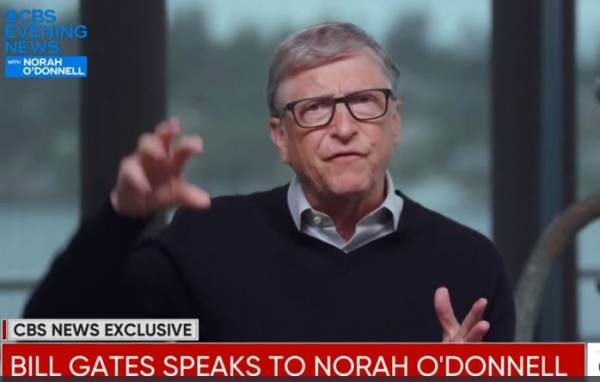Bill Gates Surprised Over “Crazy Conspiracy Theories” About Him and Dr. Fauci
Billionaire philanthropist Bill Gates told Reuters on Wednesday how surprised he was with the “crazy conspiracy theories” that have been circulating on social media about him and Anthony Fauci in regard to the coronavirus.

Do people really believe that stuff? We’re going to have to get educated about this over the next year and understand how does it change people’s behavior, how should we have minimized this either working with the social media companies or explaining what we are up to in a better way.
In fact, dozens of people have died taking the vaccines Bill Gates has been promoting for over a year.
And Gates hates President Trump and his “America First” platform but he sure loves communist China: Useful Idiot Bill Gates Praises China Regime and their ‘Handling’ of Coronavirus — Dumps on US (VIDEO).
In an interview with Reuters, Gates said the millions of online posts and “crazy conspiracy theories” about him and about top U.S. infectious disease expert Anthony Fauci had likely taken hold in part because of the combination of a frightening viral pandemic and the rise of social media.
“Nobody would have predicted that I and Dr. Fauci would be so prominent in these really evil theories,”
Gates said.
“I’m very surprised by that. I hope it goes away.”.
As philanthropists increasingly fill in the funding gaps at news organizations—a role that is almost certain to expand in the media downturn following the coronavirus pandemic—an underexamined worry is how this will affect the ways newsrooms report on their benefactors. Nowhere does this concern loom larger than with the Gates Foundation, a leading donor to newsrooms and a frequent subject of favorable news coverage.
I recently examined nearly twenty thousand charitable grants the Gates Foundation had made through the end of June and found more than $250 million going toward journalism. Recipients included news operations like the BBC, NBC, Al Jazeera, ProPublica, National Journal, The Guardian, Univision, Medium, the Financial Times, The Atlantic, the Texas Tribune, Gannett, Washington Monthly, Le Monde, and the Center for Investigative Reporting; charitable organizations affiliated with news outlets, like BBC Media Action and the New York Times’ Neediest Cases Fund; media companies such as Participant, whose documentary Waiting for “Superman” supports Gates’s agenda on charter schools; journalistic organizations such as the Pulitzer Center on Crisis Reporting, the National Press Foundation, and the International Center for Journalists; and a variety of other groups creating news content or working on journalism, such as the Leo Burnett Company, an ad agency that Gates commissioned to create a “news site” to promote the success of aid groups. In some cases, recipients say they distributed part of the funding as subgrants to other journalistic organizations—which makes it difficult to see the full picture of Gates’s funding into the fourth estate.
The foundation even helped fund a 2016 report from the American Press Institute that was used to develop guidelines on how newsrooms can maintain editorial independence from philanthropic funders. A top-level finding: “There is little evidence that funders insist on or have any editorial review.” Notably, the study’s underlying survey data showed that nearly a third of funders reported having seen at least some content they funded before publication.
Gates’s generosity appears to have helped foster an increasingly friendly media environment for the world’s most visible charity.
Read the full article at the original website.
References:
